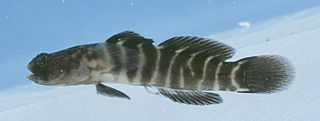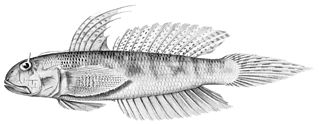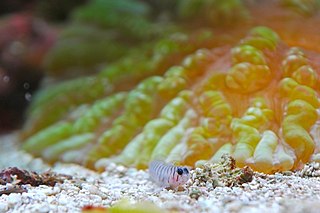
Saccopharynx is a genus of deep-sea eels with large mouths, distensible stomachs and long, scaleless bodies. Commonly, these fish are called gulpers or gulper eels. It is the only genus in the family Saccopharyngidae, and is part of the derived lineage of the "saccopharyngiforms," which includes other mid-water eel species. The name is from Latin saccus meaning "sack" and Greek φάρυγξ, pharynx.

Elacatinus is a genus of small marine gobies, often known collectively as the neon gobies. Although only one species, E. oceanops, is technically the "neon goby," because of their similar appearance, other members of the genus are generally labeled neon gobies, as well. Except for a single East Pacific species, all reside in warmer parts of the West Atlantic, including the Caribbean and Gulf of Mexico. They are known for engaging in symbiosis with other marine creatures by providing them cleaning service that consists of getting rid of ectoparasites on their bodies. In return, Elacatinus species obtain their primary source of food, ectoparasites.
Chaenopsis is a genus of pikeblennies found in the Pacific and Atlantic oceans.
Haptoclinus is a genus of labrisomid blennies native to the Caribbean Sea.

Paraclinus is a genus of labrisomid blennies native to eastern Pacific Ocean and the western Atlantic Ocean.

Dysomma is a genus of eels in the cutthroat eel family Synaphobranchidae.

Rhinogobiops is a genus of true gobies in the family Gobiidae. It is monotypic, being represented by the single species, Rhinogobiops nicholsii, also known as the blackeye goby, bluespot goby, and crested goby. They are common inhabitants of coral reefs and rocky habitats along the eastern Pacific Ocean coasts of Mexico, the United States, and Canada, although they are hardly noticed, as they often rest motionless near their shelters.

Ophidion is a genus of cusk-eels.
Barbulifer is a genus of gobies native to the tropical Atlantic coast of the Americas as well as the Gulf of California on the Pacific coast.
Barbuligobius boehlkei, the Cryptic bearded goby, is a species of goby native to the Indian Ocean and the western Pacific Ocean where it can be found on sand-rubble substrates at depths of from 1 to 15 metres. This species grows to a length of 2 centimetres (0.79 in) SL. This species is the only known member of its genus. Its specific name honours James E. Böhlke (1930-1982) of the Academy of Natural Sciences of Philadelphia.
Coryphopterus is a genus of gobies primarily found in the western Atlantic Ocean, although some species are found in the Indian and/or Pacific oceans.

Gobiosoma is a genus of gobies native to fresh, brackish and marine waters of the Americas.

Lythrypnus is a genus of gobies native to the Atlantic and Pacific coasts of the Americas including Cocos Island and the Galapagos Islands.

Oxyurichthys is a genus of fish in the subfamily Gobionellinae, commonly known as arrowfin gobies. They are distributed in the tropical and subtropical Indian and Pacific Oceans; one species is also known from the western Atlantic Ocean. Most species live in shallow waters under 10 meters deep over fine substrates such as silt.
Psilotris is a genus of gobies native to the western Atlantic Ocean.
Robinsichthys arrowsmithensis is a species of goby found on the Arrowsmith Bank in the Caribbean Sea at depths of from 92 to 596 metres. This species grows to a length of 2.3 centimetres (0.91 in) SL. This species is the only known member of its genus. The name of this genus honours C. Richard Robins (1928-2020), an American ichthyologist who was an important contributor to the study of gobies of the Americas.

Tigrigobius is a genus of small, often strikingly colored gobies native to warmer parts of the east Pacific and west Atlantic, including the Gulf of California and Caribbean. They were formerly included in Gobiosoma. Some species of Tigrigobius are known to act as cleaners.

Varicus is a genus of fish in the family Gobiidae, the gobies. They are native to the western Atlantic Ocean.

Lipogramma is a genus of fish in the family Grammatidae native to the western Atlantic Ocean.
Evermannichthys bicolor is a perciform species of fish in the family Gobiidae. As their name suggests, fishes in this species live inside sponges and can be found in the Caribbean Sea. The size of their populations are unknown, meaning it is not currently clear whether the bicolored sponge goby is in need of conservation.












